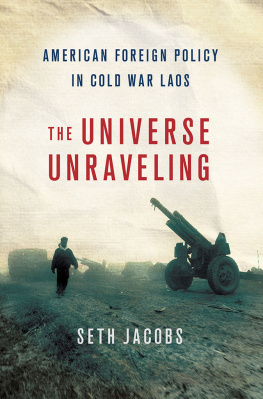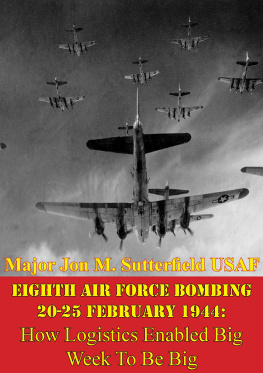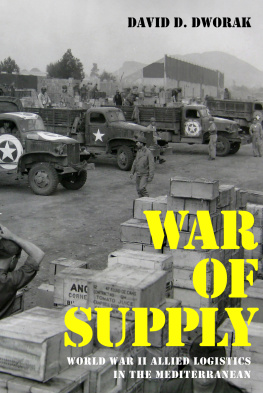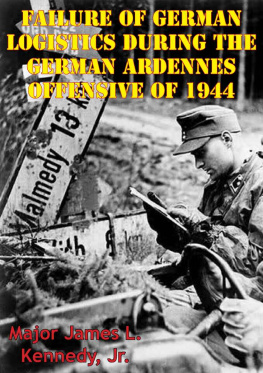MILITARY LOGISTICS
and
STRATEGIC PERFORMANCE
Cass Series: Strategy and History
Series Editors: Colin Gray and Williamson Murray
ISSN: 1473-6403
This new series will focus on the theory and practice of strategy. Following Clausewitz, strategy has been understood to mean the use made of force, and the threat of the use of force, for the ends of policy. This series is as interested in ideas as in historical cases of grand strategy and military strategy in action. All historical periods, near and past, and even future, are of interest. In addition to original monographs, the series will from time to time publish edited reprints of neglected classics as well as collections of essays.
1. Military Logistics and Strategic Performance, Thomas M. Kane
2. Strategy for Chaos: RMA Theory and the Evidence of History, Colin Gray
3. The Myth of Inevitable American Defeat in Vietnam, Dale Walton
MILITARY LOGISTICS
and
STRATEGIC PERFORMANCE
THOMAS M. KANE
University of Hull
First Published in 2001 in Great Britain by
Routledge
2 Park Square, Milton Park, Abingdon, Oxon, OX14 4RN
270 Madison Ave, New York NY 10016
Transferred to Digital Printing 2008
Website www.routledge.com
Copyright 2001 Thomas M. Kane
British Library Cataloguing in Publication Data
Kane, Thomas M.
Military logistics and strategic performance
1. Logistics 2. Strategy
I. Title
355.411
ISBN 0-7146-5161-3 (cloth)
ISSN 1473-6403
Library Congress Cataloging-in-Publication Data
Kane, Thomas M., 1969-
Military logistics and strategic performance / Thomas M. Kane.
p. cm.
Includes bibliographical references and index.
ISBN 0-7146-5161-3 (cloth)
1. Logistics. 2. Strategy. I. Title.
U168.K35 2001
355.411 dc21
00-069446
All rights reserved. No part of this publication may be reproduced, stored in or introduced into a retrieval system or transmitted in any form or by any means, electronic, mechanical, photocopying, recording or otherwise, without the prior written permission of the publisher of this book.
Typeset in 10/12 Minion by Cambridge Photosetting Services
Publishers Note
The publisher has gone to great lengths to ensure the quality of this reprint but points out that some imperfections in the original may be apparent.
To my father, Norman E. Kane
Contents
Series Editors Preface
This is a profound book on a much-neglected subject which speaks to core matters of strategy. That is why we, the editors, are delighted to have Tom Kanes Military Logistics and Strategic Performance as the first book in our new series on Strategy and History. In our view, Dr Kane advances the understanding of strategy through proper application of historical method. He is respectful of the value of theory, recognizing that the facts will not speak, neatly organized, for themselves. However, he is even more respectful of empirical evidence and, in general, of an inductive spirit in scholarship. Kane is gloriously damning of that genus of speculative general theory which sees facts as the manufactured products of chosen ideas. Readers of this book should profit from, and enjoy, the authors willingness fearlessly to criticize even the grandest of contemporary theorists in political science for a fundamentally irresponsible attitude to evidence. Kane affronts several of the scholarly deities of post-modernity when he affirms the creed that we must increase, rather than reduce, the amount of empiricism in our work (p.178).
Kane is not the first social scientist to write about military logistics, but he is by far the most successful. If this book provided simply a superior set of case studies of better and worse performance in the science of supply and movement, then it would probably not feature in this series. The most valuable distinguishing characteristic of Military Logistics and Strategic Performance is, as the title claims, its systematically strategic focus. Many doctrine manuals and studies assert the strategic significance of logistics, but none before Kane including the formidably insightful Martin Van Creveld has really shown persuasively how the two relate umbilically to each other. Military history is full of examples of great adventures which appeared to triumph over logistical frailty, and of other great adventures which were brought to nought apparently because of those frailties. In short, history yields ever-arguable evidence in abundance to illustrate any position in argument a scholar prefers to take. Kane is one of the few scholars who has grasped that, to have resort to a bastard form of a familiar proposition, they cannot logistics know who only logistics know. The path to better understanding of how to think about logistics does not lie, at least does not only lie, through more and more detailed logistical studies. Such an approach would be akin to the fallacious view that if a medium-sized heap of artillery shells is good for the prospects of offensive success, then a veritable mountain of the same should all but guarantee victory. The key to offensive success is not the mindless maximization of supply, but rather a timely reliability of sufficient supply, yielding the opportunity for the art of strategy to show its magic.
Kane emphasizes the essential unity of strategy, logistics and command. He highlights the significance of context: logistics ought to excite us, because it helps to set the stage upon which strategists act, and therefore ranks among the factors which decide the course and outcome of a war (p. 1). Kane advises, convincingly, that [t]o provide the resources which strategy requires, logisticians must participate in the making of strategy, not only in the planning phase of a campaign, but every step of the way (p. 5). Synergism and nuance pervade this sophisticated study. The author does not conceal his ambition, recommending that a fresh analysis of logistics needs to encompass all levels of activity from battlefield tactics to national policy without attempting to impose artificial boundaries between them (p. 8). As if that were not enough, Kane then adds the wise, if complicating, judgement that such an analysis must never overlook the fact that, although causes may lead to effects, the process is often part of a larger pattern and is seldom direct. In other words, while the author argues for the systematic importance of the logistical dimension of strategy, he is fully alert to the peril which menaced the Western Allies in 191517, of confusing logistics with strategy. The measure of scholarly success of this book lies almost as much in what the author does not claim for his theme as for what he does.
Military Logistics and Strategic Performance offers remarkable value for a volume of such modest dimensions. It can be read with profit as: a major contribution to the debate among (mostly) historians about military logistics launched a generation ago by Van Creveld with his tour de force, Supplying War; a valuable addition to the unduly slim library of comparative historical case studies on logistics; or as an exceedingly rare bid to explain how logistics works strategically. In our opinion, the book succeeds admirably in all three regards.











